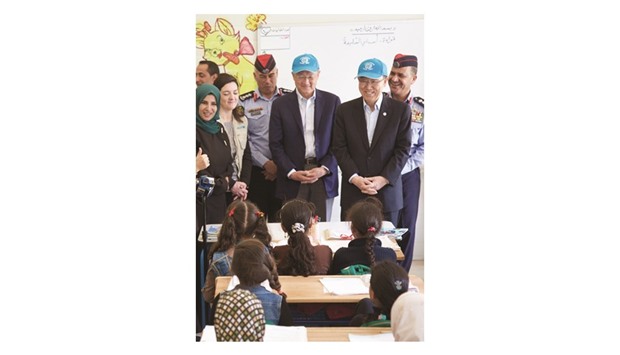Mohamed Ramadan, 30, did not think he would be stranded in the world’s largest Syrian refugee camp for so long.
When he fled Daraa province in southern Syria with his wife and children, he packed for 15 days.
That was three years back.
His two sons are now 5 and 3, while his daughter of 1 year and 7 months was born in the Zaatari refugee camp in northern Jordan. Eighty babies are born in the camp each week.
“I do nothing. I have no work. We just sit here with the kids,” Ramadan says.
His small container home has a mattresses, some plastic drawers, a ventilator, heater and a small TV.
As soon as rationed electricity comes on at 4pm, the children watch TV until they go to bed at 9pm.
Ramadan is one of almost 1.5mn Syrians in Jordan, of who 640,000 are registered with the UN Refugee Agency (UNHCR).
Under a rotation system, he works only once every three months for about one week - cleaning, painting, tiling, whatever is available in nearby Jordanian towns.
Zaatari, which opened in 2012, has grown into a container city of 80,000 people that stretches into the desert as far as the eye can see.
The camp has nine primary schools, but, with no higher education and little work, offers no future.
While 40,000 refugees live in the newer Azraq camp, further south, a majority of Syrians live in Jordan’s towns and cities.
Jordan’s “biggest fear” is a repetition of the Palestinian refugee problem, says Khaled Shorman of Masar Centre, a Jordanian non-government organisation that has projects for Syrian refugees in Zaatari and elsewhere.
Some Palestinian refugee camps in Jordan are more than 60 years old and they are still just that - camps. The government does not allow bricks into the Syrian camps amid fears that they could become permanent settlements.
“Jordanians at first were very welcoming,” says Shorman. They saw it as their duty to help fellow Arabs. In the border areas especially, Jordanians and Syrians, many of them members of the same tribes, had close trade and social ties.
But tensions have been growing.
“Jordanians are feeling they are taking over the country. There’s competition for everything,” says Shorman.
“If Germany is struggling, what can we do?” he asks, referring to the influx of some 1.1mn migrants in Germany last year and the refugee crisis that Europe is dealing with.
Adnan al-Sawa’er, an independent parliamentarian, says: “We are not against having the Syrian refugees in our country. The Syrians are our neighbours and brothers. But we have our own issues to deal with.”
Al-Sawa’er said in Amman that “an addition of 20% to the population of Jordan is really a big threat to Jordan’s stability and security.”
Unemployment in the kingdom is at least 13% and higher near the border with Syria.
Some Jordanians get angry when they queue in supermarkets with a meager basket of rice and bread, next to a Syrian with a trolley full of meat and chicken, who has a World Food Programme smart card, says Shorman.
Every Syrian in Jordan can register with UNHCR and gets 20 dinars (under $30) put on the card each month. A family of five would get 100 dinars a month. It’s enough to buy food, not clothes or other items. But for some Jordanians with no jobs it is more than they can afford.
“When the Arab Spring broke out, we hosted them, but we didn’t expect this huge number to stay,” says Fawaz al-Zu’bi, a centrist lawmaker from Ramtha, 30km from Zaatari.
The border city’s population has almost doubled, from 80,000 four years ago to more than 150,000, meaning every second person is Syrian.
Housing prices have surged. Classrooms are overcrowded. Waiting times for health services have climbed from an average 15 minutes to up to two hours.
Then, like in Europe, there’s the fear of radicals infiltrating across the border along with the families fleeing war.
The world should give more direct financial assistance to Jordan, not just to the camps, says al-Zu’bi, otherwise radicalism and terrorism “will spread, not just here, but all over.”
Ramadan has been planning to return home to Syria for the past two years. But some camp residents who ventured back, or dangerously tried to cross Syria from south to north to the Turkish border - in the hope of reaching Europe - “sent stories back to people here not to try it.
About life in the camp, he says: “It’s not easy. But the situation in Syria isn’t easy either, so we are waiting.”

A handout picture provided by the UN refugee agency (UNHCR) shows UN chief Ban Ki-moon (right) and World Bank President Jim Yong Kim (centre) meeting with young Syrian refugees during a visit at the Zaatari refugee camp, located close to the northern Jordanian city of Mafraq near the border with Syria, last month.
